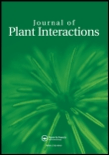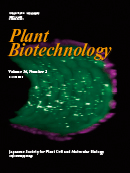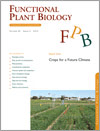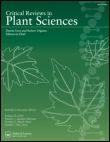
JOURNAL OF PLANT BIOLOGY
Scope & Guideline
Cultivating Knowledge for Sustainable Solutions
Introduction
Aims and Scopes
- Molecular and Genetic Studies:
The journal publishes research on the genetic and molecular basis of plant traits, including studies on gene function, expression, and regulation, which are crucial for understanding plant development and adaptation. - Plant Stress Responses:
A significant focus is on how plants respond to abiotic and biotic stresses, such as drought, salinity, and pathogen attacks. This includes investigations into signaling pathways, stress tolerance mechanisms, and the role of phytohormones. - Plant Development and Physiology:
Research related to plant growth and developmental processes, including flowering, root development, and reproductive biology, is a core area of interest, often exploring the underlying cellular and molecular mechanisms. - Ecological and Environmental Interactions:
The journal emphasizes studies on plant interactions within ecosystems, including pollination biology, allelopathy, and the impact of environmental changes on plant communities. - Biotechnology and Genetic Engineering:
The application of biotechnological approaches for crop improvement, including transgenic technologies and genome editing, is a key area, with an emphasis on enhancing traits such as stress tolerance and yield.
Trending and Emerging
- Omics Approaches in Plant Research:
There is a marked increase in the use of transcriptomics, proteomics, and metabolomics to understand complex plant traits and responses. These approaches allow for comprehensive insights into the molecular mechanisms underlying plant functions. - Climate Change and Plant Adaptation:
Research addressing the impacts of climate change on plant physiology, development, and ecology is gaining traction. Studies focus on how plants adapt to changing climatic conditions, which is crucial for future agricultural sustainability. - Plant-Microbe Interactions:
The exploration of interactions between plants and microorganisms, including beneficial symbiosis and pathogenic relationships, is increasingly prominent. This research is vital for understanding nutrient uptake, disease resistance, and ecosystem dynamics. - CRISPR and Genome Editing Technologies:
The application of CRISPR technology in plant research, particularly for trait improvement and functional genomics, is rapidly expanding. This trend reflects the growing importance of precision breeding in crop development. - Sustainable Agriculture Practices:
Research focusing on sustainable agricultural practices, including the use of biocontrol agents and biostimulants, is emerging as a significant theme, highlighting the need for environmentally friendly approaches in crop production.
Declining or Waning
- Traditional Taxonomy and Systematics:
Research focused solely on the traditional classification and systematics of plant species appears to be waning, as the journal shifts towards more integrative approaches that combine molecular tools with ecological and functional studies. - Basic Morphological Studies:
There is a noticeable decline in papers dedicated to basic morphological descriptions of plants. Instead, the focus has shifted towards understanding the functional significance of morphology in relation to environmental interactions and stress responses. - Historical Plant Pathology:
Research that primarily reviews historical perspectives on plant diseases or pathogens without a strong experimental component is becoming less frequent, as there is a greater emphasis on contemporary molecular and genomic approaches to understanding plant-pathogen interactions.
Similar Journals

JOURNAL OF PLANT BIOCHEMISTRY AND BIOTECHNOLOGY
Bridging Research and Application in Crop ScienceJOURNAL OF PLANT BIOCHEMISTRY AND BIOTECHNOLOGY, published by SPRINGER INDIA, is a leading publication dedicated to advancing research in the fields of plant biochemistry, biotechnology, agronomy, and crop science. With an ISSN of 0971-7811 and E-ISSN 0974-1275, the journal encompasses a wide range of studies aimed at enhancing our understanding of plant biological processes and their applications in agriculture and biotechnology. It has achieved a noteworthy Q2 ranking in Agronomy and Crop Science and Plant Science, as well as a Q3 ranking in Biotechnology, reflecting its quality and relevance in contemporary research. Notably, the journal ranks #166 in Plant Science and #133 in Agronomy, both falling in the top 67th percentile. With a rich history spanning from 1992 to 2024, the journal is committed to providing open access to innovative research findings that bridge the gap between laboratory discoveries and their practical applications in sustainable agriculture. Researchers, professionals, and students will find a wealth of knowledge and inspiration to advance their work in the dynamic field of plant sciences at this esteemed journal.

Journal of Plant Interactions
Bridging Disciplines in Plant EcologyThe Journal of Plant Interactions, published by Taylor & Francis Ltd in the United Kingdom, serves as a leading open-access platform dedicated to advancing the understanding of plant interactions and their ecological implications. Established in 2005 and transitioning to open access in 2015, this journal focuses on both fundamental and applied aspects of plant interactions, providing invaluable insights for researchers, professionals, and students within the fields of Ecology and Plant Science. With a commendable impact factor and ranked in the second quartile (Q2) for both Ecology, Evolution, Behavior and Systematics and Plant Science, it reflects the quality and relevance of its published research. Researchers aiming to publish innovative studies on plant behavior and ecosystem dynamics will find a welcoming avenue for their work, as the journal is dedicated to fostering open dialogue and sharing knowledge across disciplines.

Plant Biotechnology
Cultivating Insights for a Greener Future.Plant Biotechnology is a distinguished journal published by the Japanese Society for Plant Cell and Molecular Biology, committed to advancing the field of plant biotechnology through the dissemination of high-quality research. With an ISSN of 1342-4580, this journal caters to a global audience interested in agronomy, crop science, and plant molecular biology. The journal has achieved notable rankings, including Q2 in Agronomy and Crop Science and Q2 in Plant Science, underscoring its relevance and impact in these fields according to the latest 2023 metrics. Furthermore, it holds a respectable position within Scopus rankings across multiple categories, indicating its contribution to the academic community. Although it is not an open-access journal, its regular publications, spanning from 1997 to 2024, feature cutting-edge studies that explore innovative approaches and technologies in plant science. Researchers, professionals, and students will find Plant Biotechnology an essential resource for staying informed on significant advancements and trends in plant research.

FUNCTIONAL PLANT BIOLOGY
Unlocking the Secrets of Plant FunctionalityFUNCTIONAL PLANT BIOLOGY is a prestigious academic journal published by CSIRO PUBLISHING, specializing in the dynamic fields of Agronomy and Crop Science as well as Plant Science. With an ISSN of 1445-4408 and an E-ISSN of 1445-4416, this journal provides a platform for innovative research that addresses key challenges in plant functional biology, ranging from genetics and physiology to ecological interactions. As evidenced by its impact factor and competitive rankings, including Q1 in Agronomy and Crop Science and Q2 in Plant Science, FUNCTIONAL PLANT BIOLOGY holds a significant place in the scientific community, ranking in the top tiers of Scopus for both categories. The journal supports open access options, ensuring that critical research is widely disseminated and accessible to researchers, professionals, and students around the globe. With a publication history spanning from 2002 to 2024, the journal continues to foster the advancement of plant science, making significant contributions to sustainable agricultural practices and ecological research in Australia and beyond.

CRITICAL REVIEWS IN PLANT SCIENCES
Pioneering critical reviews for a greener future.CRITICAL REVIEWS IN PLANT SCIENCES, published by Taylor & Francis Inc, is a prestigious journal that has been advancing the field of plant science since its inception in 1983. With an impressive impact factor and consistently ranked in the top quartile (Q1) of its category, this journal is a leading platform for the dissemination of peer-reviewed research that spans the breadth of plant biology, ecology, and agricultural applications. Housed in the United Kingdom, it serves an international readership, making significant contributions to our understanding of plant systems and their environmental interactions. This journal is highly regarded within the Scopus rankings, holding an impressive position of 18 out of 516 journals in the Agriculture and Biological Sciences category, placing it in the 96th percentile. Although not currently open access, the journal provides valuable insights and critical reviews that are essential for researchers, professionals, and students striving to further their knowledge and bolster their own research in plant sciences.

RUSSIAN JOURNAL OF PLANT PHYSIOLOGY
Illuminating the Science Behind Plant LifeRUSSIAN JOURNAL OF PLANT PHYSIOLOGY, an esteemed publication with ISSN 1021-4437 and E-ISSN 1608-3407, is dedicated to advancing knowledge in the field of plant science. Published by PLEIADES PUBLISHING INC in the United States, this journal serves as a critical platform for researchers, professionals, and students aiming to explore the intricacies of plant physiology, biochemistry, and environmental interactions. With a consistent output from 1996 to 2024, the journal holds a commendable position within the academic community, reflected in its Q3 ranking among 516 journals in the Plant Science category (2023) and a competitive 44th percentile ranking in the Scopus database. Although the journal is not Open Access, it continues to attract a diverse readership of scholars eager to publish groundbreaking research. It stands out as a vital resource for anyone engaged in understanding the physiological processes that underpin plant life, thereby contributing to global agricultural advancements and ecological sustainability.

aBIOTECH
Exploring the frontiers of molecular biology.aBIOTECH, published by SPRINGERNATURE, is a premier academic journal dedicated to advancing the fields of biotechnology, agronomy, and molecular biology. With an impressive ISSN of 2096-6326 and E-ISSN 2662-1738, this journal has established itself as a vital resource for researchers and professionals aiming to publish high-quality, impactful studies. Based in Singapore, aBIOTECH has achieved remarkable recognition, boasting a Q1 ranking in multiple categories including Agronomy and Crop Science, Biochemistry, and Genetics in the 2023 Scopus rankings. Its solid position in the 90th percentile for Biochemistry and Genetics reinforces its significance within the global scientific community. The journal covers a broad spectrum of topics relevant to both basic and applied research, facilitating a shared dialogue amongst scientists and encouraging collaborative progress in innovative biotechnological applications. The open-access nature of the journal ensures that cutting-edge research is freely available, fostering a global exchange of ideas that is critical to the advancement of science today.

Current Plant Biology
Advancing the Frontiers of Plant ScienceCurrent Plant Biology is a distinguished peer-reviewed journal published by ELSEVIER, focusing on the dynamic and rapidly evolving field of plant sciences. Since its inception as an Open Access publication in 2014, it has established itself as a leading platform for innovative research, boasting a remarkable Impact Factor that underscores its relevance and contribution to the scientific community. Based in the Netherlands, this journal caters to a diverse audience of researchers, professionals, and students, facilitating the dissemination of key findings in an array of disciplines including biochemistry, genetics, cell biology, and developmental biology. Recognized for its rigorous standards, Current Plant Biology holds a prestigious standing, classified within the Q1 and Q2 quartiles of various Scopus categories, reflecting its impact and reputation in the realms of Plant Science and related fields. The journal is committed to providing accessible and high-quality research outputs that inspire further investigation and collaboration in plant biology.

JOURNAL OF PLANT RESEARCH
Exploring the Frontiers of Plant Biology.JOURNAL OF PLANT RESEARCH, published by SPRINGER JAPAN KK, is a leading academic journal that has carved a niche in the field of Plant Science. With its ISSN 0918-9440 and E-ISSN 1618-0860, this journal has been disseminating high-quality research since its inception in 1993 and continues to be essential reading for academics and practitioners alike, aiming to bridge the gap between innovative plant research and practical applications. The journal is highly regarded, holding a prestigious Q1 ranking in Plant Science for 2023, and is positioned in the top 80th percentile within the Scopus rankings for Agricultural and Biological Sciences. The journal's coverage includes a wealth of topics pertinent to advancing our understanding of plant biology, ecology, and sustainable agricultural practices. Although it operates under a subscription model, its influence in the research community remains profound, making it a vital resource for contemporary studies in plant-related disciplines.

PHYSIOLOGY AND MOLECULAR BIOLOGY OF PLANTS
Bridging Research and Application in Plant SciencePHYSIOLOGY AND MOLECULAR BIOLOGY OF PLANTS, published by SPRINGER, is a vital journal focused on the advancing field of plant science. Featuring research that spans physiology, molecular biology, and their applications in agriculture, this journal is pivotal for academics, professionals, and students keen on understanding plant processes and enhancing crop production. With an ISSN of 0971-5894 and an E-ISSN of 0974-0430, this journal is recognized for its scholarly significance, ranking in the Q3 category in Molecular Biology, Q2 in Physiology, and Q1 in Plant Science as of 2023. The journal maintains a strong position in the Scopus rankings, with notable percentile rankings including 87th in Plant Science. Established in 2000, this publication aims to foster the dissemination of cutting-edge research by providing a platform for open discussion and knowledge sharing about plant physiology and molecular mechanisms. While it does not currently offer open access options, its comprehensive studies and reviews serve as an essential resource for enhancing our understanding of plant biology.